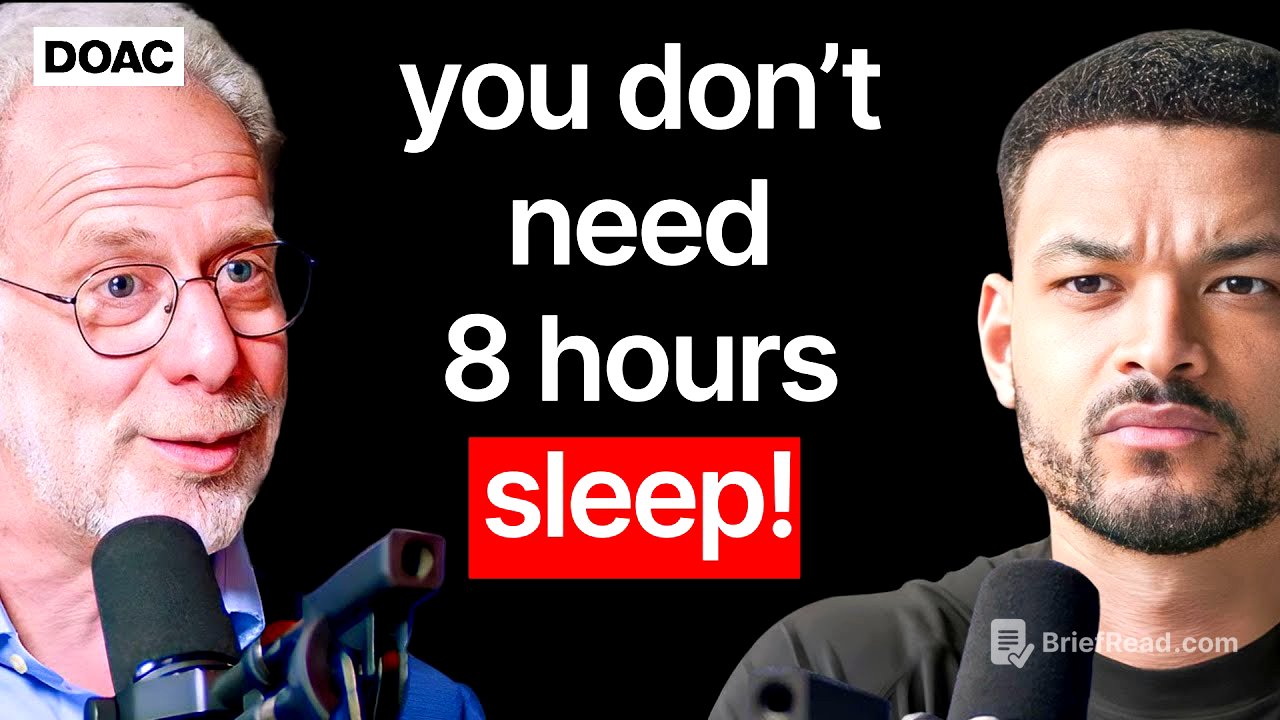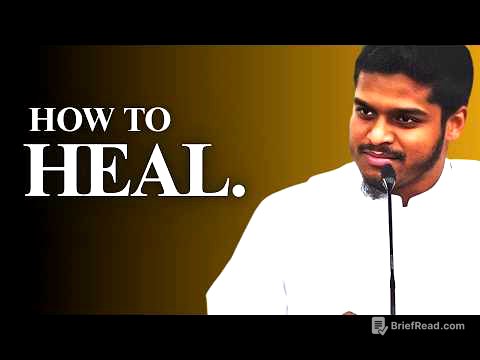TLDR;
This episode of The Diary Of A CEO features Daniel Lieberman, a Harvard professor of evolutionary biology, discussing exercise, nutrition, sleep, and disease prevention from an evolutionary perspective. Lieberman challenges common exercise myths, emphasizes the importance of physical activity for overall health, and advocates for societal changes to promote healthier lifestyles. He highlights the necessity of strength training, the dangers of excessive sugar, and the significance of social connections in maintaining an active life.
- Exercise is a weird concept from evolutionary perspective.
- Genes load the gun, environment pulls the trigger.
- Physical activity slows aging.
- We need more compassion towards people who struggle to exercise.
Intro [0:00]
The episode introduces Daniel Lieberman, a Harvard professor and author, who studies human evolution and its relationship to health and disease. Lieberman discusses the importance of physical activity, nutrition, and sleep, and how modern lifestyles contribute to preventable diseases. He emphasizes the need for strength training and challenges common myths about exercise and aging.
Why do you do this research? [2:38]
Daniel Lieberman explains that his initial interest in human evolution, particularly the study of skulls and heads, led him to public health and the evolution of running and physical activity. This path evolved into evolutionary medicine, which applies evolutionary theory and data to address health and disease issues.
Where has your work taken you? [3:35]
Lieberman's work in evolutionary medicine has taken him to various parts of the world, including Kenya, Africa, and Mexico, to study diverse populations and their lifestyles. He emphasizes that most medical information comes from a small fraction of the world's population (United States, Canada, Europe, and Australia), so studying other populations is crucial to understanding how bodies truly work and have evolved. His research focuses on how these populations are transitioning to Western lifestyles.
Has your research shifted your perspective on exercise? [4:34]
Lieberman shares an epiphany he had while working in Mexico with the Tarahumara, who are famous for their long-distance running. He realized that the concept of "training" doesn't exist in their language or culture. An elderly Tarahumara runner questioned why anyone would run if they didn't have to, highlighting that exercise is a strange concept for those who are already physically active through farming or hunting and gathering.
The biggest exercise myths [5:55]
Lieberman addresses several exercise myths, including the idea that you need eight hours of sleep and that sitting is the new smoking. He argues that these concepts are contradictory. He explains that sitting is not inherently bad, as all animals, including hunter-gatherers, sit. The problem is prolonged, uninterrupted sitting without adequate physical activity. Hunter-gatherers interrupt their sitting with frequent movement, which activates cellular mechanisms and lowers blood sugar levels. He also debunks the myth that everyone needs eight hours of sleep, noting that people in non-industrialized societies sleep around six to seven hours a night.
The importance of weight training [12:00]
Lieberman shares that he has become more serious about strength training due to his research. He notes the importance of resistance training, especially as people age, to combat sarcopenia (muscle loss). He highlights that aging is inevitable, but sarcopenia can be slowed down with physical activity, particularly strength training.
Why always moving your body is so important [16:12]
Lieberman emphasizes the "use it or lose it" principle, explaining that humans evolved to be grandparents who remain physically active. He cites a study of Harvard alumni showing that the benefits of physical activity increase with age, with those in their 60s and 70s experiencing significantly lower death rates. He connects retirement and loss of a partner to decreased physical activity and increased vulnerability to diseases.
Genetics vs lifestyle [19:47]
Lieberman discusses the interplay between genetics and lifestyle, stating, "genes load the gun, environment pulls the trigger." While genetics may predispose individuals to certain diseases, environmental factors, such as physical activity, play a more significant role. He stresses that exercise can substantially lower the risk of cardiovascular disease, diabetes, and Alzheimer's, and that we have control over our environment to some extent.
Have we evolved to be lazy? [24:20]
Lieberman clarifies that humans evolved to conserve energy and rest whenever possible, but not necessarily to be lazy. He points out that modern conveniences optimize for ease and comfort, leading to a "comfort crisis." He argues that while comfort is desirable, it's not always beneficial, and we must now make a conscious effort to be physically active.
We should be preventing diseases, not medicating them [25:46]
Lieberman criticizes the current medical approach of medicating diseases rather than preventing them. He notes that medical students are taught that certain conditions, like high blood pressure, are inevitable with aging, which is not true in physically active populations. He points out that in the U.S., only 3% of the healthcare budget is spent on prevention, despite 75% of diseases being preventable.
Do hunter-gatherers get the same diseases as us? [28:13]
Lieberman addresses the prevalence of diseases like cancer and Alzheimer's in hunter-gatherer communities. While diagnostic tools are limited in these populations, he notes that cancer rates are generally lower in non-Western societies and are strongly associated with wealth. He explains that cancer is a disease of energy, where cells compete for resources, and high insulin levels are carcinogenic. Physical activity lowers the risk of almost every type of cancer.
The truth about sugar [31:32]
Lieberman identifies three key factors for health: avoiding smoking, exercising, and reducing sugar intake. He explains that high-glycemic foods elevate blood glucose and insulin levels, which promote energy storage and can lead to inflammation. He describes how excess fat causes fat cells to swell and rupture, triggering systemic inflammation. Exercise helps regulate inflammation by producing interleukin-6 (IL-6), an anti-inflammatory molecule.
How would you redesign our society? [37:30]
Lieberman discusses how he would redesign society to promote health and happiness. He suggests nudging people towards healthier choices through taxation on sugary foods, advertising healthy foods, and making healthy options more affordable. He also proposes sponsoring community activities like dancing and integrating nutrition and exercise education into medical schools.
Should organisations force people to exercise? [42:18]
Lieberman shares the example of the Bjorn Borg sports company in Sweden, where the CEO requires all employees to exercise. While acknowledging that mandatory exercise might be seen as overreach, he notes that universities used to require physical education. He suggests that companies can facilitate physical activity by enabling and promoting social clubs and fitness initiatives.
What did you learn from these tribes? [48:25]
Lieberman recounts his experiences with the Tarahumara tribe, emphasizing that physical activity is a spiritual practice for them. He explains that their long-distance races are a form of prayer and a metaphor for life. He notes that this spiritual element was once common among Native American tribes and that endurance events are a tradition in many cultures.
Why you should do strength training on your feet [50:03]
Lieberman discusses plantar fasciitis as a mismatch disease caused by weak feet due to modern footwear. He explains that stiff-soled shoes with arch supports prevent foot muscles from working, leading to a weakened plantar fascia. He recommends strengthening the feet through exercises, wearing minimal shoes, and going barefoot more often. He cautions against transitioning too quickly to minimal shoes to avoid re-injury.
Is too much muscle bad? [56:38]
Lieberman explains that excessive muscle mass is energetically expensive and can be deleterious for hunter-gatherers or subsistence farmers living on the margin of food security. He notes that natural selection favors having enough muscle to meet demands but not more. He suggests that the physiques seen in modern gyms are a privilege not typically found in non-Western populations or among our ancestors.
Running myths [1:01:46]
Lieberman debunks the myth that running is bad for your knees, stating that it does not increase the risk of arthritis. He explains that knee injuries are common in running, but arthritis is caused by cartilage wearing away, and running does not increase cartilage damage. He suggests that running may even be slightly preventive. He also discusses the importance of proper running form, advocating for a forefoot or mid-foot strike to reduce impact on the knees.
The best cardio workout [1:06:58]
Lieberman advises that the best cardiovascular exercise is the one you enjoy doing. He recommends mixing up different types of exercise, including low and high-intensity cardio and strength training. He emphasizes that there is no one perfect exercise and that bodies benefit from variety.
The best exercise for weight loss [1:09:21]
Lieberman addresses the debate around exercise and weight loss. He explains that while low doses of exercise (e.g., 150 minutes per week) may not lead to significant weight loss, higher doses (300 minutes or more) can be effective. However, he stresses that exercise alone is unlikely to result in rapid or substantial weight loss. He highlights that exercise is crucial for preventing weight gain or regain after dieting.
Why we need more compassion around exercise [1:15:59]
Lieberman emphasizes the need for compassion and understanding towards those who struggle with exercise. He argues that shaming and blaming are counterproductive and that people should not feel bad for taking elevators or wanting to eat chocolate cake. He stresses that anything is better than nothing and that small steps can lead to significant benefits.
What is it that actually gets people exercising? [1:20:46]
Lieberman suggests that the key to becoming an exerciser is the social aspect and accountability. He explains that physical activity is more rewarding when it's social, such as running with friends or dancing. He also highlights the importance of accountability, whether through a commitment contract or a running buddy.
The last guest's question [1:24:59]
Lieberman answers the previous guest's question about the aspect of his life that causes the most friction or discomfort. He identifies his tendency to compare himself to others as a bad habit that leads to unhealthy feelings of pride or jealousy. He acknowledges that overcoming this habit is a continuous effort.







![Peppa Pig - Granny and Grandpa's Attic (42 episode / 2 season) [HD]](https://wm-img.halpindev.com/p-briefread_c-10_b-10/urlb/aHR0cDovL2ltZy55b3V0dWJlLmNvbS92aS9pWmltUlJDU3h6SS9ocWRlZmF1bHQuanBn.jpg)

